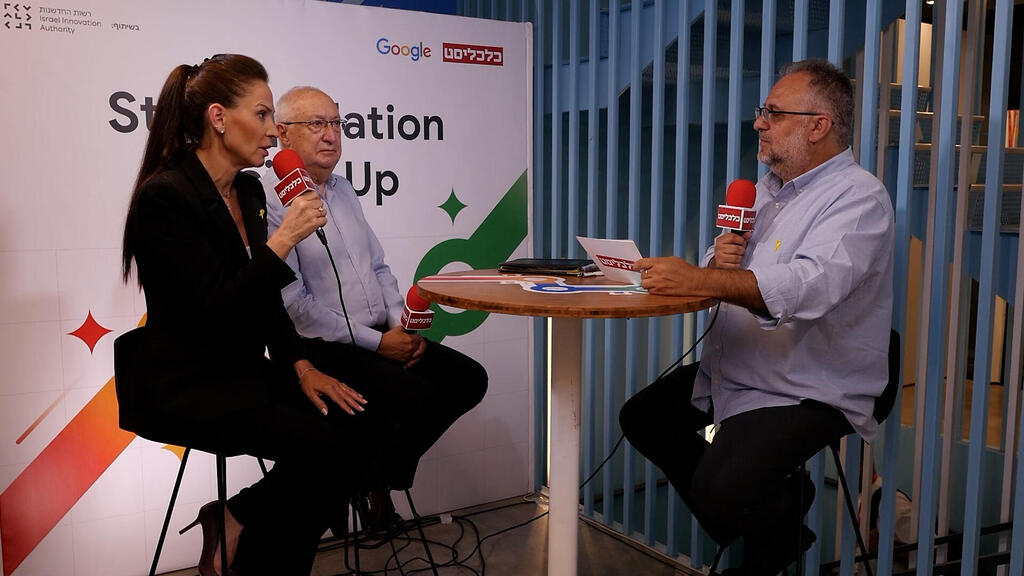
"The world’s interest in Israel is not because we are nice, but because we are needed"
Yifat Oron, Senior Managing Director at Blackstone and Head of the Tel Aviv Office, was speaking as part of Google and Calcalist’s Startup Week. Prof. Manuel Trajtenberg said: “Israeli high-tech was born in very stressful situations, and it has always shown its ability to adapt and its creativity. This ability has become the main characteristic of the industry.”
“The world’s interest in Israel is not because we are nice, but because we are needed. We manage to bring many multinational companies here that end up acquiring our companies because they need the technology and the teams. On the other hand, we also know how to attract investors, because they know how to generate a return here,” said Yifat Oron, Senior Managing Director at Blackstone and Head of the Tel Aviv Office, during a discussion on the importance of Israeli high-tech in the global technological and economic ecosystem, held as part of Google and Calcalist’s Startup Week.
In a panel focused on artificial intelligence (AI), Professor Manuel Trajtenberg—professor of economics at Tel Aviv University and senior fellow at the Mandel Foundation for Leadership—also participated. He addressed the underlying strengths of Israeli high-tech entrepreneurs. In his view, there is no single explanation, but the question itself offers part of the answer: “Israeli high-tech was born in highly stressful situations, and it has always demonstrated its adaptability and creativity. These traits have become defining characteristics of the industry: the ability to see opportunities where others see problems, to reinvent itself in response to technological shifts—as we see today in AI—and to find new markets even in times of global disruption.”
1 View gallery


Yifat Oron and Prof. Manuel Trajtenberg talk with Elihay Vidal at Startup Week
(Sinai David)
However, Trajtenberg emphasized that Israeli high-tech currently faces dual challenges: domestic turmoil within Israel and global instability—both geopolitical and economic. Confronting both simultaneously is “not easy, but I believe it is possible.”
Oron agreed with Trajtenberg’s macro analysis and expanded on it from a business and investment perspective. According to her, what sets Israeli high-tech apart is its “ability to produce technology—especially deep tech—that the market consistently needs.” This has been evident in past breakthroughs in telecommunications and chips, and more recently in cyber and AI. She explained that the capability to develop the right solutions at the right time—and to build companies and generate returns through exits or sales—is what continues to draw investor interest, even amid market volatility.
Oron noted that in 2024, investment volume rose by 30% compared to 2023, reaching $12 billion. In mergers and acquisitions (M&A), she said, “we’ve shattered glass ceilings… with several very, very large deals, and one that is truly massive,” driving global momentum and increasing recognition of Israel as a hub for building “giant companies.”
The key question now is how to maintain this level of global appeal—particularly in AI—amid concerns that Israel could miss the "train." Professor Trajtenberg emphasized the role of the government in three crucial areas:
- Training high-quality talent via universities, colleges, and military units like Unit 8200.
- Providing infrastructure, which is especially critical in the AI era, where large-scale infrastructure is needed to support technologies like large language models (LLMs). Trajtenberg expressed skepticism that any single private entity in Israel could provide such infrastructure and argued that a government-led initiative or public-private collaboration is essential.
- Ensuring political stability, which he described as the most problematic yet essential condition, despite the industry’s resilience.
Yifat Oron added that Israel has always succeeded in closing technological gaps. The AI space consists of both an infrastructure layer (LLMs) and an application layer, and Israeli startups “play across the entire field.” While building massive infrastructure is no small feat, she pointed to key players like Nvidia, which has committed to expanding its workforce in Israel and may also expand infrastructure.
Oron expressed confidence in the “ingenuity of the Israeli entrepreneur,” who knows how to operate even under budget constraints. She emphasized that AI is now central to nearly every Israeli company—not just pure AI firms but also those leveraging AI to grow, increase profitability, and modernize.
Trajtenberg cited the example of DeepSeek as a breakthrough technology that makes AI capabilities accessible with less computational power, aligning well with the “Israeli mentality.” He also mentioned new university-led initiatives to support basic AI research, which will require government funding.
Oron added that a strong business environment is essential for attracting foreign investors. This includes transparent accounting standards and a reliable legal system that offer confidence despite Israel’s geographical distance from key markets.
Geopolitical changes and Israel’s security situation have raised the question of whether the country’s location might give it an advantage amid rising defense budgets worldwide. Trajtenberg noted that the global retreat from hyper-globalization has not been helpful to Israel, but the country continues to maintain extensive international ties. There has been a dramatic shift in how European governments view security, leading to increased investment and collaboration. “They look at us and see this extraordinary ability to harness cutting-edge technology for security needs—tremendous opportunities are opening up,” he said.
In this new era, startups—not just major corporations—are entering the defense technology space, a shift that “suits Israel very well.”
On the question of future exits, Oron said the global markets are anticipating a reopening of IPO activity in 2025. “There’s a very, very long queue for IPOs,” she noted, but Israeli firms are well-positioned due to their maturity. She pointed to a growing trend of private equity funds eyeing Israel as a source of acquisition targets. While tech giants were traditionally the main buyers, private equity is now “helping the whole ecosystem” by allowing earlier-stage investors to realize returns and enabling founders to “continue leading the company as if almost nothing has changed.” This trend, she concluded, “will be very welcome and will inject new energy and momentum into our market.”













